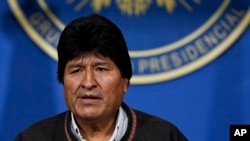Bolivian president Evo Morales announced his resignation in a televised address Sunday after weeks of protests around "irregularities" in last month's elections.
Earlier in the day, he agreed to call new elections after the Organization of American States released the results of its audit into the October 20 vote, which Morales narrowly won. The OAS found irregularities in nearly every area which it reviewed.
But within hours, Bolivia's military chief General Williams Kaliman said holding a new election was not enough. "After analyzing the situation of internal conflict, we ask the president to resign, allowing peace to be restored and stability to be maintained for the good of our Bolivia,'' Kaliman said.
The announcements by Kaliman and the OAS led to the resignation of several senior ministers as well as the head of the Supreme Electoral Tribunal.
The United States welcomed the decision to hold a new vote.
"Fully support the findings of the @OAS_official report recommending new elections in #Bolivia to ensure a truly democratic process representative of the people’s will. The credibility of the electoral system must be restored," U.S. Secretary of State Mike Pompeo tweeted.
Morales, who is serving his fourth term as president, had previously called the protests around his election a coup.
The long-time president did not indicate whether he would once again be running in the new elections. Despite Sunday's announcement, opposition leaders have continued to call for him to step down.
Latin America's longest-serving leader went into the election needing a 10 percentage-point lead to avoid a runoff and secure his fourth term in office.
Partial results released after the election had predicted Morales would face a December runoff election against his main rival, former President Carlos Mesa.
Then, less than 24 hours later, the electoral commission released new numbers that showed with 95% of votes counted, Morales was just a 0.7 percentage point short of the 10 percentage-point mark.
The announcement prompted opposition complaints of fraud, and triggered violent protests in several cities.





